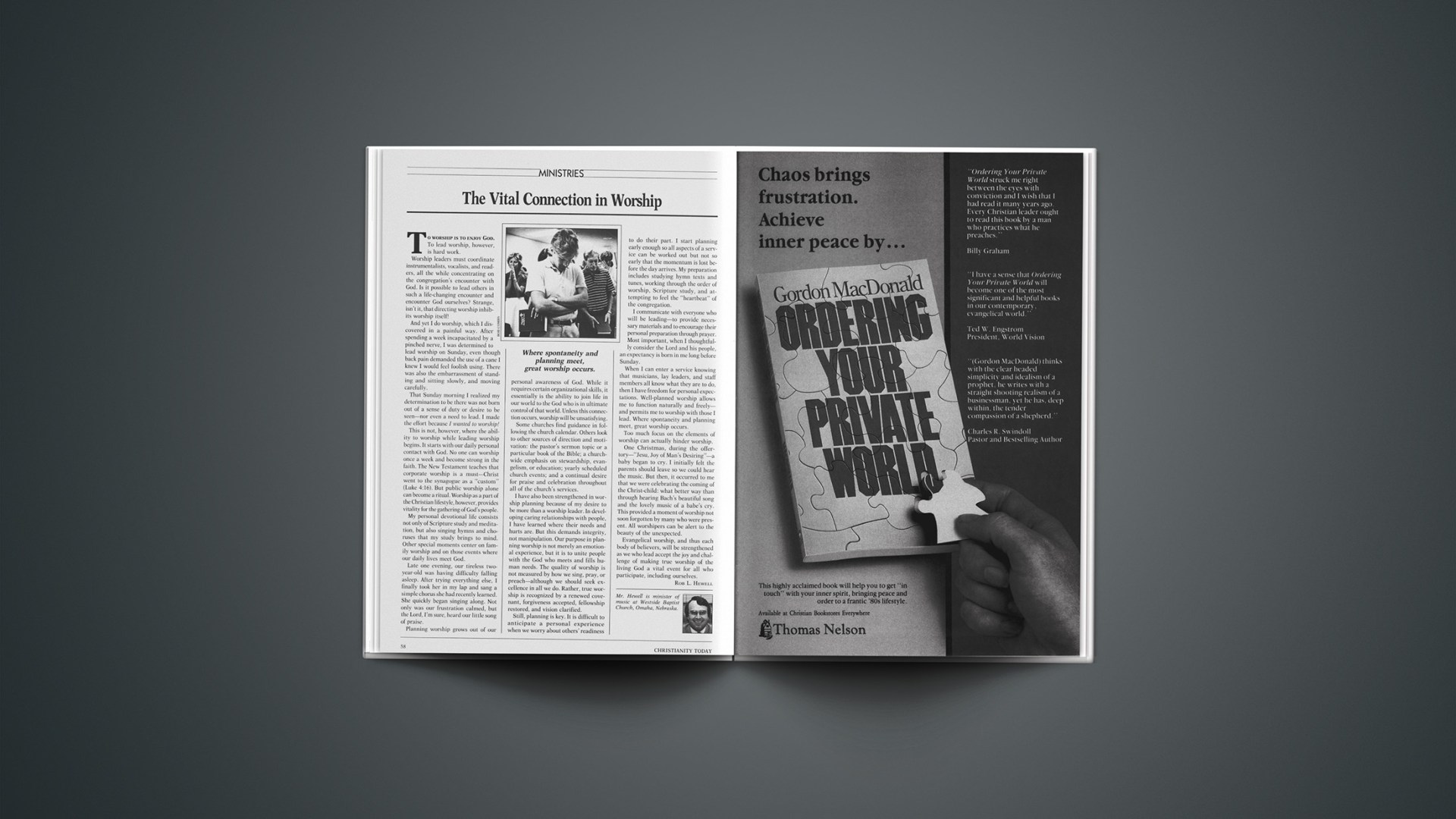To worship is to enjoy god. To lead worship, however, is hard work.
Worship leaders must coordinate instrumentalists, vocalists, and readers, all the while concentrating on the congregation’s encounter with God. Is it possible to lead others in such a life-changing encounter and encounter God ourselves? Strange, isn’t it, that directing worship inhibits worship itself!
And yet I do worship, which I discovered in a painful way. After spending a week incapacitated by a pinched nerve, I was determined to lead worship on Sunday, even though back pain demanded the use of a cane I knew I would feel foolish using. There was also the embarrassment of standing and sitting slowly, and moving carefully.
That Sunday morning I realized my determination to be there was not born out of a sense of duty or desire to be seen—nor even a need to lead. I made the effort because I wanted to worship!
This is not, however, where the ability to worship while leading worship begins. It starts with our daily personal contact with God. No one can worship once a week and become strong in the faith. The New Testament teaches that corporate worship is a must—Christ went to the synagogue as a “custom” (Luke 4:16). But public worship alone can become a ritual. Worship as a part of the Christian lifestyle, however, provides vitality for the gathering of God’s people.
My personal devotional life consists not only of Scripture study and meditation, but also singing hymns and choruses that my study brings to mind. Other special moments center on family worship and on those events where our daily lives meet God.
Late one evening, our tireless two-year-old was having difficulty falling asleep. After trying everything else, I finally took her in my lap and sang a simple chorus she had recently learned. She quickly began singing along. Not only was our frustration calmed, but the Lord, I’m sure, heard our little song of praise.
Planning worship grows out of our personal awareness of God. While it requires certain organizational skills, it essentially is the ability to join life in our world to the God who is in ultimate control of that world. Unless this connection occurs, worship will be unsatisfying.
Some churches find guidance in following the church calendar. Others look to other sources of direction and motivation: the pastor’s sermon topic or a particular book of the Bible; a churchwide emphasis on stewardship, evangelism, or education; yearly scheduled church events; and a continual desire for praise and celebration throughout all of the church’s services.
I have also been strengthened in worship planning because of my desire to be more than a worship leader. In developing caring relationships with people, I have learned where their needs and hurts are. But this demands integrity, not manipulation. Our purpose in planning worship is not merely an emotional experience, but it is to unite people with the God who meets and fills human needs. The quality of worship is not measured by how we sing, pray, or preach—although we should seek excellence in all we do. Rather, true worship is recognized by a renewed covenant, forgiveness accepted, fellowship restored, and vision clarified.
Still, planning is key. It is difficult to anticipate a personal experience when we worry about others’ readiness to do their part. I start planning early enough so all aspects of a service can be worked out but not so early that the momentum is lost before the day arrives. My preparation includes studying hymn texts and tunes, working through the order of worship, Scripture study, and attempting to feel the “heartbeat” of the congregation.
I communicate with everyone who will be leading—to provide necessary materials and to encourage their personal preparation through prayer. Most important, when I thoughtfully consider the Lord and his people, an expectancy is born in me long before Sunday.
When I can enter a service knowing that musicians, lay leaders, and staff members all know what they are to do, then I have freedom for personal expectations. Well-planned worship allows me to function naturally and freely—and permits me to worship with those I lead. Where spontaneity and planning meet, great worship occurs.
Too much focus on the elements of worship can actually hinder worship.
One Christmas, during the offertory—“Jesu, Joy of Man’s Desiring”—a baby began to cry. I initially felt the parents should leave so we could hear the music. But then, it occurred to me that we were celebrating the coming of the Christ-child: what better way than through hearing Bach’s beautiful song and the lovely music of a babe’s cry. This provided a moment of worship not soon forgotten by many who were present. All worshipers can be alert to the beauty of the unexpected.
Evangelical worship, and thus each body of believers, will be strengthened as we who lead accept the joy and challenge of making true worship of the living God a vital event for all who participate, including ourselves.
1 Mr. Hewell is minister of music at Westside Baptist Church, Omaha, Nebraska.










